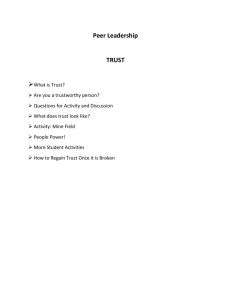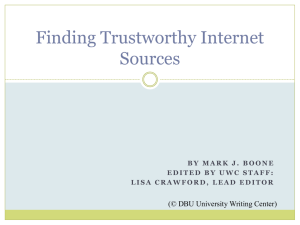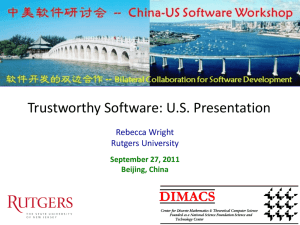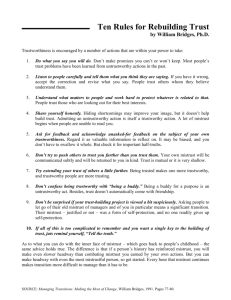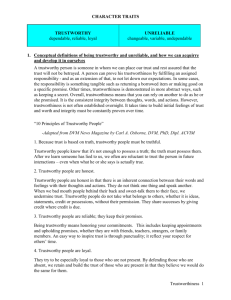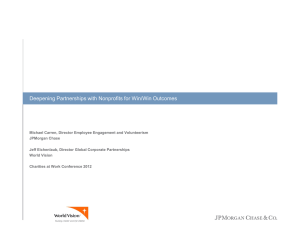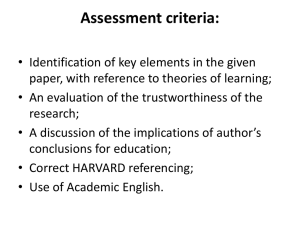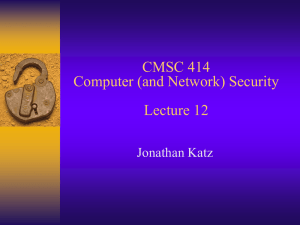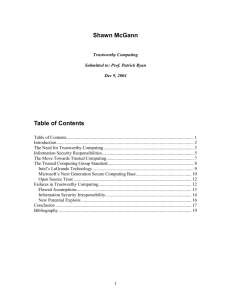Trustworthy Teacher Action Research
advertisement
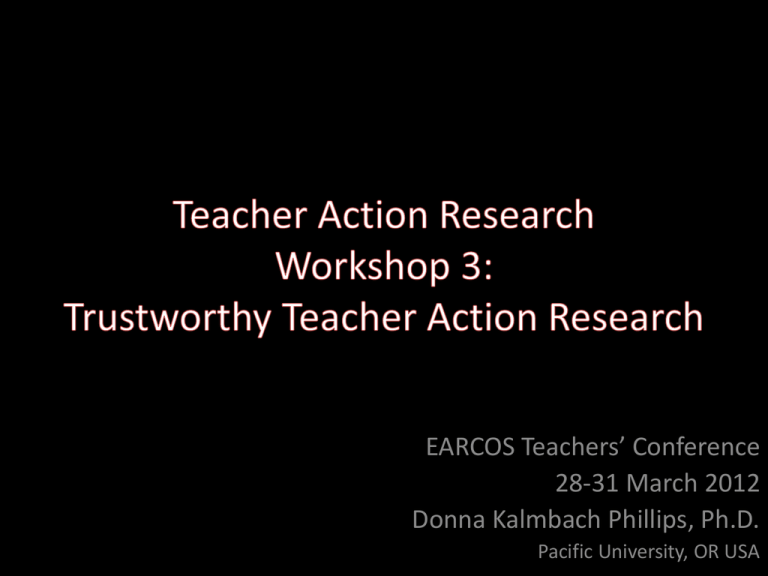
EARCOS Teachers’ Conference 28-31 March 2012 Donna Kalmbach Phillips, Ph.D. Pacific University, OR USA Trustworthy Teacher Action Research What makes a teacher action research project ‘good’? This interactive workshop is designed to introduce criteria for creating and implementing trustworthy action research projects. Participants will analyze the role of triangulation and self-reflexivity; consider the selection of appropriate data collection strategies; and explore the importance of critical colleagues and collaboration. Teacher Action Research: Process Workshops Framing the Study Trustworthy Action Research Design Data Analysis, Interpretation Discover an Area of Focus Criteria for Trustworthiness Data Analysis Fundamentals Develop a critical Question Research Design Ongoing Analysis: Cycle & Strategies Research Design Triangulation Final Data Interpretation Literature Review Researcher Dispositions Going Public ………………………………………………………Critical Questions…………………………………………………………… What is trustworthy action research? Methodological Rigor “Since action research starts with everyday experience and is concerned with the development of living knowledge in many ways the process of inquiry is as important as specific outcomes.” Reason & Bradbury, 2001 Criteria of Trustworthy Action Research Criteria of Trustworthy Action Research Criteria of Trustworthy Action Research Criteria of Trustworthy Action Research Multiple Perspectives: Triangulation Observation Researcher’s Journal ? Artifact Interview “Thick Description” Researcher’s Journal Seeking Multiple Perspectives: Data Collection Seeking Multiple Voices: Colleagues, students, parents, specialists, community members. Criteria of Trustworthy Action Research Criteria of Trustworthy Action Research Criteria of Trustworthy Action Research What kind of design supports trustworthy AR? •Gets to the heart of what you want to study •Focused but not too narrow •Structured and flexible •Deliberately plans for on-going assessment, adjustments •Is do-able: enriches & energizes, does not overwhelm Who is the trustworthy researcher? •Curious •Tenacious •Risk-taker •Able to re-frame, re-configure, re-think •Collaborative Critique Research Design for Trustworthiness •Find a partner •Read through the integrated research design •Critique for trustworthiness •Act as a critical colleague: What are the strengths? What suggestions would you make? •Focused but not narrow •Structured with flexibility •Deliberate plans for on-going analysis •Is do-able as a teacher Getting Started What is my area of interest? What is my question? What design gets to the heart of what I want to study? What am I going to try out, evaluate and study? What data will best serve my research? When is it best to conduct this research? What is a possible time line? Who should be involved and in what ways? What are my paradigm, beliefs and biases? What literature do I need to read? How can I find this out? Ethical Considerations of Action Research: Gaining Permissions Question 1: Will your research project be made public? Yes No You must gain written permission from parents and verbal permission from students. University and/or school district policies may apply If the project is embedded within the teaching-learning project, you may not need to gain permissions. Check with EARCOS. Getting permission is always preferred. Question 2: Does your research project include participants who may be more vulnerable than others or have protected status under law? YES Permission is critical. Check with school See Question 1 administrator. Make sure informed consent letters are sent home, can be read & understood by parents/guardians, and are returned signed by parents/guardians. NO Question 3: Is there any possibility that data collected from your research project would be harmful to participants (emotionally, physically)? YES Re-think & revise your project. Anything harmful, even potentially harmful, should not be included in the project. This includes any opportunities for other students to bully students or threat to a student’s sense of self-worth. Grades should never be tied to the AR project. NO Excellent! Continue to next question. Question 4: Do you plan to collect images of students? YES Many schools have policies surrounding video-imaging and/or taking pictures of students, even if they are not going to be made public. Check with administrator. If you plan to include any images in a public presentation of any kind, you must seek and have signed permission from parents/guardians/students. Be specific about the kind of images you will collect, where and how they will be displayed, and how they will be stored. NO Are you sure? Often, audio-recordings, video-images, and/or digital pictures are excellent data, support triangulation, and place other data in context. Getting Permission: Informed Consent Topic of Project Objective of project Interventions, strategies, what will be tried out Data to be collected Timeline of project Why & how image-taking will happen; what will happen to images Request to use images How project will be made public How confidentiality will be maintained Any potential risks A returned slip to be signed by parents Action research is systematic. … It involves a self-reflective spiral of planning, acting, observing, reflecting and re-planning. It requires teachers to be acutely aware of a sense of process, and to refine their perceptions to account for that process…action research raises to a conscious level much of what is already being done by good teachers on an intuitive level. It enables teachers to identify and come to grips with their practice in a human way that is at once supportive and critical. McNiff, 2008 Teacher Action Research: Process Workshops Framing the Study Trustworthy Action Research Design Data Analysis, Interpretation Discover an Area of Focus Criteria for Trustworthiness Data Analysis Fundamentals Develop a critical Question Research Design Ongoing Analysis: Cycle & Strategies Research Design Triangulation Final Data Interpretation Literature Review Researcher Dispositions Going Public ………………………………………………………Critical Questions…………………………………………………………… Reference List
